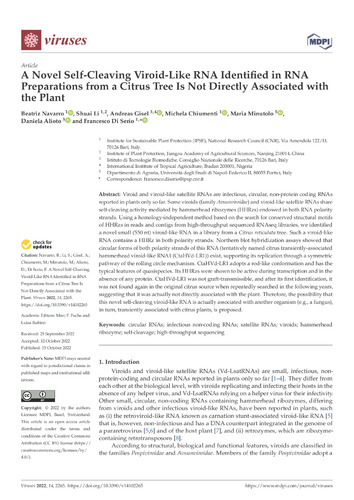A novel self-cleaving viroid-like RNA identified in RNA preparations from a citrus tree is not directly associated with the plant
Abstract
Viroid and viroid-like satellite RNAs are infectious, circular, non-protein coding RNAs reported in plants only so far. Some viroids (family Avsunviroidae) and viroid-like satellite RNAs share self-cleaving activity mediated by hammerhead ribozymes (HHRzs) endowed in both RNA polarity strands. Using a homology-independent method based on the search for conserved structural motifs of HHRzs in reads and contigs from high-throughput sequenced RNAseq libraries, we identified a novel small (550 nt) viroid-like RNA in a library from a Citrus reticulata tree. Such a viroid-like RNA contains a HHRz in both polarity strands. Northern blot hybridization assays showed that circular forms of both polarity strands of this RNA (tentatively named citrus transiently-associated hammerhead viroid-like RNA1 (CtaHVd-LR1)) exist, supporting its replication through a symmetric pathway of the rolling circle mechanism. CtaHVd-LR1 adopts a rod-like conformation and has the typical features of quasispecies. Its HHRzs were shown to be active during transcription and in the absence of any protein. CtaHVd-LR1 was not graft-transmissible, and after its first identification, it was not found again in the original citrus source when repeatedly searched in the following years, suggesting that it was actually not directly associated with the plant. Therefore, the possibility that this novel self-cleaving viroid-like RNA is actually associated with another organism (e.g., a fungus), in turn, transiently associated with citrus plants, is proposed

